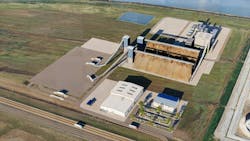Microsoft Signs Largest Engineered Carbon Removal Contract
Microsoft has signed the world’s largest contract for engineered carbon removal to date—committing to remove 6.75 million metric tons of carbon dioxide over 15 years through a new facility being developed in Louisiana.
The project is being led by AtmosClear BR, LLC, a company focused on carbon removal, and backed by investment firm Fidelis. The facility will be located at the Port of Greater Baton Rouge and is designed to use a technology known as bioenergy with carbon capture and storage (BECCS). This approach involves generating energy from organic waste—such as sugarcane byproducts and sustainably sourced wood trimmings—while capturing and permanently storing the carbon emissions produced.
Once operational, the plant is expected to remove 680,000 metric tons of biogenic CO₂ annually, storing it underground or using it as feedstock for low-carbon fuels. Construction is scheduled to begin in 2026, with full operations slated for 2029.
The project represents more than $800 million in investment and is projected to create approximately 600 construction jobs and 75 permanent positions. It also aims to revitalize forestry-related employment in the region, which has been impacted by past mill closures.
Leaders involved in the initiative emphasized its potential to both curb emissions and boost local economies. Daniel J. Shapiro, CEO of Fidelis, called the Microsoft agreement “a transformative moment for the high-quality, engineered carbon removal market,” highlighting the project’s blend of proven technology, sustainable materials, and regional economic impact.
Microsoft, which has pledged to become carbon negative by 2030, views the project as a model for future carbon removal efforts. “High-quality, durable carbon removal solutions from experienced developers like Fidelis are vital for Microsoft,” said Brian Marrs, Senior Director of Energy & Carbon Removal at the company.
As governments and companies face growing pressure to achieve net-zero emissions, the Baton Rouge facility stands as a significant example of how large-scale, permanent carbon removal might play a role in global climate solutions.
